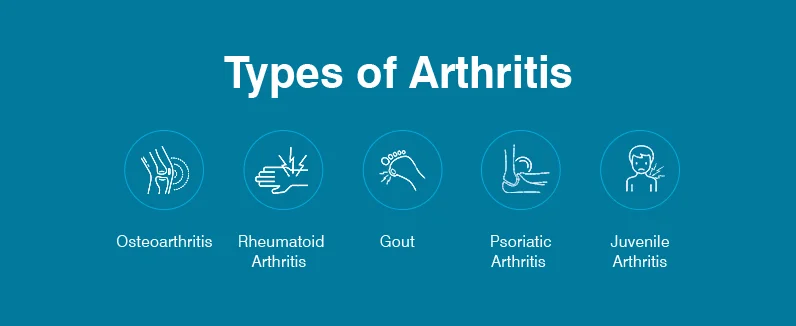Types of Arthritis
Arthritis is a condition characterized by inflammation of a joint, which results in pain, stiffness, and loss of motion in some cases. Arthritis is a relatively common condition in India and affects 15% people i.e. over 180 million people in India. There exist about 100 different types of arthritis, out of which some are very common and others are extremely rare. Most signs of arthritis are similar such as joint pain, inflammation, problems with movement, fatigue etc. However, there still exist certain differences between each type. Some common types of rthritis, include-
Osteoarthritis
Osteoarthritis is a chronic, progressive musculoskeletal disease characterized by gradual loss of cartilage in joints which causes the bones to rub together. This results in stiffness, pain, and impaired movement. The disease most commonly affects the joints in the knees, hands, spine, hips, and feet. it is the most frequent joint disease with a prevalence of 22% to 39% in India. OA is more common in women than men. Nearly, 45% of women over the age of 65 years have symptoms while 70% of those over 65 years show radiological evidence of OA. Some common osteoarthritis symptoms include-
- Pain in the joint, especially knee joint pain
- Stiffness in the joint
- A decreased range of motion.
- Swelling.
While there is no cure for osteoarthritis, the right treatment plan can help you stay active, prevent joint damage, limit injury, and manage pain. Treatment mainly includes anti-inflammatory and pain-relieving medicines, physiotherapy and low-grade exercise.
Rheumatoid arthritis
Rheumatoid arthritis (RA) affects about 1% of adult population in India. It is an autoimmune disease (abnormal immune system) in which the body’s immune system, which works to protects its health by fighting foreign substances like bacteria and viruses, accidentally attack the joints. Rheumatoid arthritis affects the lining of your joints, causing a painful swelling that can eventually result in bone erosion and joint deformity. The most common symptoms caused by RA include-
- Fatigue or lack of energy
- Minor fever
- Joint tenderness
- Painful joints
- Joint stiffness
- Joint warmness and redness
- Joint swelling
- Weight loss
RA is a chronic condition with no cure, however, physiotherapy and anti-rheumatic drugs can help slow its progression.
Gout
Gout is another common type of arthritis which is caused by the deposition of uric acid crystals in a joint which results in inflammation and pain. Some common symptoms of gout, include-
- Formation of nodules under the skin called Tophi,
- Swollen joints,
- Joint redness,
- Joint pain
- Warmness in joint
The treatment for gout may depend upon the severity of the condition. The joint pain treatment mainly comprises of anti-inflammatory medication (NSAIDs) and lifestyle modifications. Such as indulging in physical activity, following a healthy diet, and limiting alcohol intake.
Psoriatic Arthritis
Psoriatic arthritis is a joint disorder often accompanied by a skin infection called psoriasis. Under this condition, the immune system of the body attacks the healthy tissue leading to inflammation in the joints. Some general symptoms of psoriatic arthritis include-
- Swollen or tender joints
- Swollen fingers and toes
- Morning stiffness
- Painful muscles and tendons
- Scaly skin patches, which may get worse when joint pain occurs
Treatment for psoriatic arthritis may include medication to reduce inflammation, steroid injections and joint replacement surgery or lifestyle changes.
Juvenile Arthritis
Juvenile arthritis is a long-lasting, chronic disease. It is the most common form of arthritis in children. Juvenile arthritis is a condition which encompasses’ 100’s of other autoimmune and inflammatory conditions such as- Juvenile idiopathic arthritis (JIA), Juvenile dermatomyositis, Juvenile lupus, Juvenile scleroderma etc. The symptoms of JA may vary for each type, however, some common symptoms include-
- Limping, the child is not able to perform motor skills efficiently
- Joint stiffness, especially in the morning
- Pain, swelling, and tenderness in the joints
- Persistent fever
- Irritability
- Weight loss
- Rash
- Fatigue
There is no cure for juvenile arthritis, however, timely diagnosis and right treatment can relieve control pain, relieve inflammation, and improve the child’s quality of life. The treatment plan usually comprises of a combination of medicines, healthy diet and exercise.

